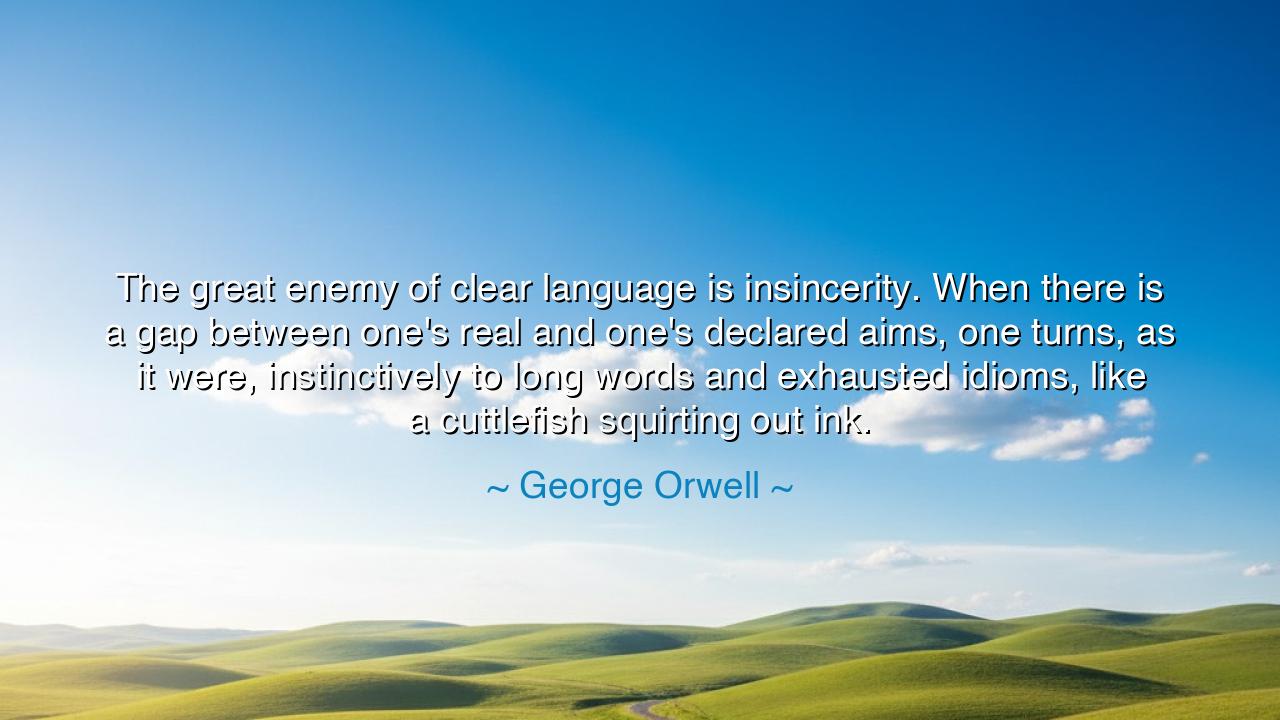
The great enemy of clear language is insincerity. When there is a
The great enemy of clear language is insincerity. When there is a gap between one's real and one's declared aims, one turns, as it were, instinctively to long words and exhausted idioms, like a cuttlefish squirting out ink.






In the twilight of the modern age, when words had become both weapons and veils, George Orwell, the prophet of honesty and clarity, spoke with piercing truth: “The great enemy of clear language is insincerity. When there is a gap between one’s real and one’s declared aims, one turns, as it were, instinctively to long words and exhausted idioms, like a cuttlefish squirting out ink.” In this statement lies a warning as old as civilization itself — that when the heart is false, the tongue follows. Orwell reminds us that language, which should be the light of thought, becomes darkness when used to disguise rather than reveal.
The origin of this quote lies in Orwell’s essay Politics and the English Language (1946), written in the aftermath of war, propaganda, and deceit. He had seen with his own eyes how governments, institutions, and even ordinary men twisted words to hide their true intentions. In the rubble of Europe’s moral and political decay, Orwell discerned a greater ruin — the corruption of language itself. He saw that when people no longer speak plainly, they no longer think clearly. And when they no longer think clearly, they can be led, like sleepwalkers, into tyranny. Thus, his warning was not about grammar or style, but about truth and conscience — that the decline of language is the mirror of a declining soul.
The “cuttlefish squirting out ink” is a vivid image, drawn from nature, yet heavy with symbolism. The cuttlefish releases its dark cloud not to reveal, but to obscure — to confuse the predator and escape. So too, says Orwell, do men of deceit cloak themselves in complex words and lifeless phrases when they fear exposure. They speak of “collateral damage” instead of the killing of innocents; of “necessary measures” instead of cruelty; of “restructuring” instead of the loss of livelihoods. Their tongues weave fogs to hide their actions, until the listener, dulled by abstraction, no longer perceives the evil within. Thus, insincerity becomes not only a moral failing but a linguistic one — a rot that spreads from thought to word, from word to world.
History offers many proofs of this truth. When the empires of the twentieth century justified their conquests, they did so not in the name of greed, but in the name of progress and civilization. When dictators silenced their opponents, they spoke not of murder, but of “maintaining order.” And even in the modern world, the same disease persists — when leaders speak of “alternative facts,” or when the powerful call cruelty “policy,” we hear the same squirt of ink, the same cowardice of language that Orwell warned us against. The tragedy of such deceit is not only that it blinds the listener, but that it corrupts the speaker, until he no longer knows the truth himself.
Yet Orwell’s teaching is not merely a condemnation — it is a call to courage. To speak clearly is to live truthfully. It demands integrity of mind and purity of intent. Clarity is not the enemy of beauty; it is beauty made honest. The plain word, born of sincerity, has more power than a thousand ornate lies. Consider Abraham Lincoln, whose Gettysburg Address stands as one of the simplest and most profound speeches in history. In a mere 272 words, he gave voice to the soul of a wounded nation, because his words were not ornaments — they were convictions. His aim and his speech were one, and thus his language endures.
Orwell’s wisdom reaches beyond politics or literature; it pierces into the heart of every person. Each of us, in daily life, faces the temptation of the cuttlefish — to cloud our meaning when truth feels dangerous, to hide behind phrases when our hearts are uncertain. We use polite falsehoods to avoid conflict, hollow enthusiasm to mask apathy, and evasive jargon to disguise failure. But in doing so, we lose something vital — our authenticity. To speak falsely, even slightly, is to drift away from our own center, to become strangers to ourselves.
The lesson, then, is timeless and sacred: let your words be as clear as your conscience. Speak only what you mean, and mean what you speak. When you find yourself tempted to use words as armor, pause and seek the truth beneath them. Simplicity is not weakness; it is strength refined. Clarity is not dullness; it is honesty illuminated. To speak clearly is to think clearly, and to think clearly is to live freely. The world has enough voices that murmur in fog — be the one who speaks like sunlight breaking through.
So, my children of the future, remember the wisdom of George Orwell. Guard your words as you would guard your soul. Do not let deceit or vanity corrupt your speech. For the moment your language ceases to serve truth, it will serve power instead — and power without truth is tyranny. Let every word you utter bear the weight of sincerity, for in the end, clear language is the echo of a clear heart, and the heart that remains true has nothing to fear from light.






AAdministratorAdministrator
Welcome, honored guests. Please leave a comment, we will respond soon